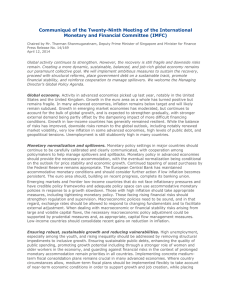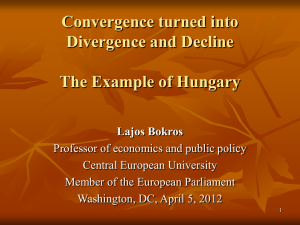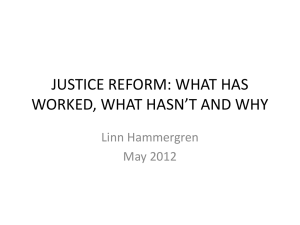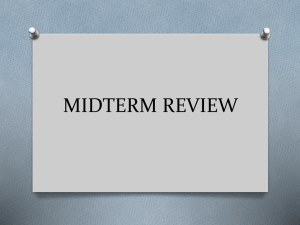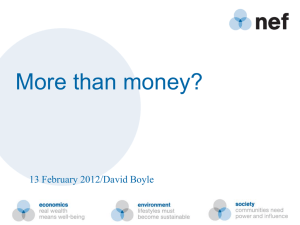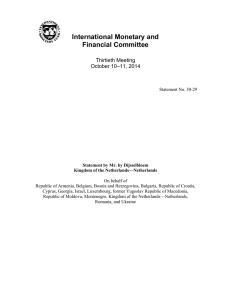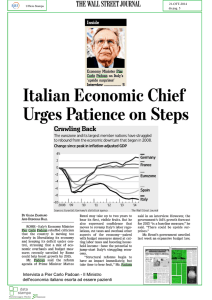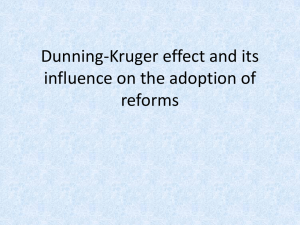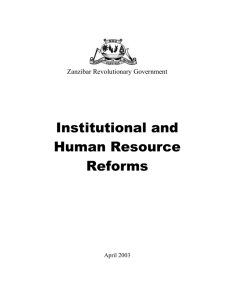A Pro-Business, Pro-Growth Agenda for Europe
advertisement
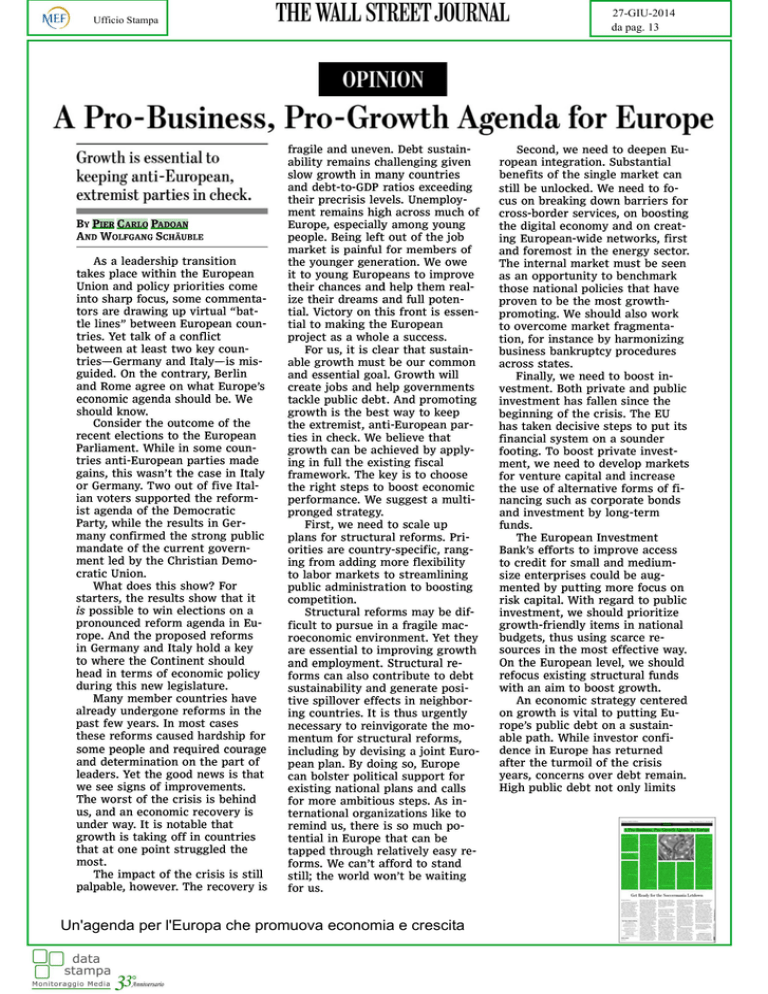
Ufficio Stampa mE WALL STREET JOURNAL 27-GIU-2014 da pag. 13 OPINION A Pro-Business, Pro-Growth Agenda for Europe Growth is essential to keeping anti-European, extremist parties in check. Bv fIEB~~ AND WOLFGANG SCHAUBLE As a leadership transition takes place within the European Union and policy priorities come into sharp focus, some commentators are drawing up virtual "battle lines" between European countries. Yet talk of a conflict between at least two key countries-Germany and Italy-is misguided. On the contrary, Berlin and Rome agree on what Europe's economic agenda should be. We should know. Consider the outcome of the recent elections to the European Parliament. While in some countries anti-European parties made gains, this wasn't the case in Italy or Germany. Two out of five Italian voters supported the reformist agenda of the Democratic Party, while the results in Germany confirmed the strong public mandate of the current government led by the Christian Democratic Union. What does this show? For starters, the results show that it is possible to win elections on a pronounced reform agenda in Europe. And the proposed reforms in Germany and Italy hold a key to where the Continent should head in terms of economic policy during this new legislature. Many member countries have already undergone reforms in the past few years. In most cases these reforms caused hardship for some people and required courage and determination on the part of leaders. Yet the good news is that we see signs of improvements. The worst of the crisis is behind us, and an economic recovery is under way. It is notable that growth is taking off in countries that at one point struggled the most. The impact of the crisis is still palpable, however. The recovery is fragile and uneven. Debt sustainability remains challenging given slow growth in many countries and debt-to-GDP ratios exceeding their precrisis levels. Unemployment remains high across much of Europe, especially among young people. Being left out of the job market is painful for members of the younger generation. We owe it to young Europeans to improve their chances and help them realize their dreams and full potential. Victory on this front is essential to making the European project as a whole a success. For us, it is clear that sustainable growth must be our common and essential goal. Growth will create jobs and help governments tackle public debt. And promoting growth is the best way to keep the extremist, anti-European parties in check. We believe that growth can be achieved by applying in full the existing fiscal framework. The key is to choose the right steps to boost economic performance. We suggest a multipronged strategy. First, we need to scale up plans for structural reforms. Priorities are country-specific, ranging from adding more flexibility to labor markets to streamlining public administration to boosting competition. Structural reforms may be difficult to pursue in a fragile macroeconomic environment. Yet they are essential to improving growth and employment. Structural reforms can also contribute to debt sustainability and generate positive spillover effects in neighboring countries. It is thus urgently necessary to reinvigorate the momentum for structural reforms, including by devising a joint European plan. By doing so, Europe can bolster political support for existing national plans and calls for more ambitious steps. As international organizations like to remind us, there is so much potential in Europe that can be tapped through relatively easy reforms. We can't afford to stand still; the world won't be waiting for us. Un'agenda per l'Europa che promuova economia e crescita DO O data stampa 0 Monitoraggio Media 3 3)1.nniversarW Second, we need to deepen European integration. Substantial benefits of the single market can still be unlocked. We need to focus on breaking down barriers for cross-border services, on boosting the digital economy and on creating European-wide networks, first and foremost in the energy sector. The internal market must be seen as an opportunity to benchmark those national policies that have proven to be the most growthpromoting. We should also work to overcome market fragmentation, for instance by harmonizing business bankruptcy procedures across states. Finally, we need to boost investment. Both private and public investment has fallen since the beginning of the crisis. The EU has taken decisive steps to put its financial system on a sounder footing. To boost private investment, we need to develop markets for venture capital and increase the use of alternative forms of financing such as corporate bonds and investment by long-term funds. The European Investment Bank's efforts to improve access to credit for small and mediumsize enterprises could be augmented by putting more focus on risk capital. With regard to public investment, we should prioritize growth-friendly items in national budgets, thus using scarce resources in the most effective way. On the European level, we should refocus existing structural funds with an aim to boost growth. An economic strategy centered on growth is vital to putting Europe's public debt on a sustainable path. While investor confidence in Europe has returned after the turmoil of the crisis years, concerns over debt remain. High public debt not only limits Ufficio Stampa mE WALL STREET JOURNAL the options of future generations unfairly but also puts governments unduly at the mercy of market sentiments. All members of the euro zone should take the right steps to put debt ratios on a declining path. The recovery in Europe needs the support of all member governments. A policy mix based on the above ingredients can revamp growth, reduce unemployment and put fiscal policy on a more sustainable path. If properly implemented, the elements interact in a virtuous way. There is a great deal at stake, not least the confidence of our citizens that the Continent is heading in the right direction. Let's leave anxiety behind us and have the courage to make farsighted decisions now. Messrs. Padoan and Schauble are the finance ministers of Italy and Germany, respectively. DO O data stampa 0 Monitoraggio Media 3 3)1.nniversarW 27-GIU-2014 da pag. 13



